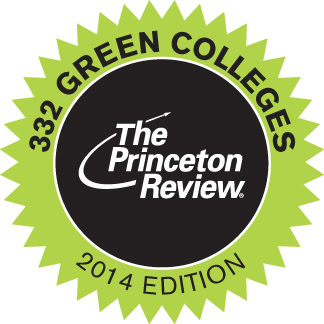The Princeton Review names Randolph one of the top green colleges in the United States
Randolph College is one of the 332 most environmentally responsible colleges in the U.S. and Canada, according to The Princeton Review, which last week published its fifth annual edition of its free downloadable book, “The Princeton Review’s Guide to 332 Green Colleges.”
 The guide calls Randolph College “ambitious and forward-thinking.” It praises the College’s commitment to sustainable operations practices, as well as its academic programs-such as the degrees offered in environmental studies and environmental science-that teach students to live sustainably and be leaders in the sustainability field.
The guide calls Randolph College “ambitious and forward-thinking.” It praises the College’s commitment to sustainable operations practices, as well as its academic programs-such as the degrees offered in environmental studies and environmental science-that teach students to live sustainably and be leaders in the sustainability field.
“Using engaging, inventive practices, the College is already making strides in the direction of sustainability,” the guide reads. It highlights Randolph’s efforts to promote the use of bicycles and carpooling, use local and organic food in dining services, and pursue environmentally-friendly building practices.
“We are pleased that The Princeton Review recognizes us as one of the nation’s most sustainability-conscious colleges,” said Randolph College President Bradley W. Bateman. “Our students, faculty, and staff are leaders in sustainability both on campus and in the community, and many of our alumnae and alumni are involved in promoting interest in the environment in their communities and workplaces. We plan to continue our efforts as a community to be sustainable and to set an example for other institutions.”
Randolph College’s green efforts are a reflection of a commitment to be environmentally responsible. This year, the College joined four other colleges in an agreement to use 100 percent renewable energy. An upcoming renovation of Wright Hall, a residence hall, will seek LEED certification. Also, the upcoming inauguration of Bateman, the College’s 10th president, has several initiatives focused making the event sustainable.
“We are pleased to recommend Randolph College to the many students seeking colleges that practice and promote environmentally-responsible choices and practices,” said Rob Franek, Senior VP/Publisher, of The Princeton Review.
The Princeton Review chose schools for this guide based on a survey it conducted in 2013 of administrators at hundreds of four-year colleges to measure the schools’ commitment to the environment and to sustainability.
The 216-page guide is the only free comprehensive resource of its kind. It can be downloaded at www.princetonreview.com/green-guide and www.centerforgreenschools.org/greenguide.
The Princeton Review created its “Guide to 332 Green Colleges” in partnership with the Center for Green Schools at the U.S. Green Building Council (USGBC).
The 322 school profiles in the guide feature essential information for applicants — facts and stats on school demographics, admission, financial aid — plus write-ups on the schools’ sustainability initiatives. A “Green Facts” sidebar reports on a wide range of topics from the school’s use of renewable energy sources, recycling and conservation programs to the availability of environmental studies and career guidance for green jobs.
Franek noted his Company’s recent survey findings indicating significant interest among college applicants in attending “green” colleges. “Among 10,116 college applicants who participated in our 2014 ‘College Hopes & Worries Survey,’ 61% said having information about a school’s commitment to the environment would influence their decision to apply to or attend the school,” he said.
Rachel Gutter, director of the Center for Green Schools at the U.S. Green Building Council, commented “In collaborating with The Princeton Review on this annual guide, we have seen that sustainability on campuses continues to be an important deciding factor for today’s four-year college bound students. We are excited to once again provide prospective students and their parents with a resource to help them navigate this often daunting decision-making process.”
In addition to the Green Colleges ranking, The Princeton Review also recognizes Randolph College as one of the best colleges in the nation. Randolph is featured in the company’s 2014 edition of its annual college guide, The Best 378 Colleges.
Tags: environmental studies, environmental sustainability, national rankings, sustainability
